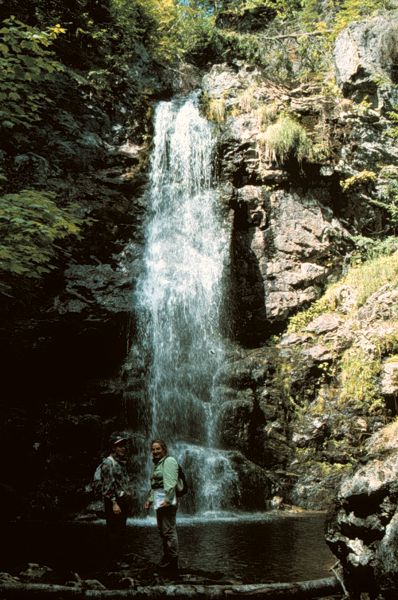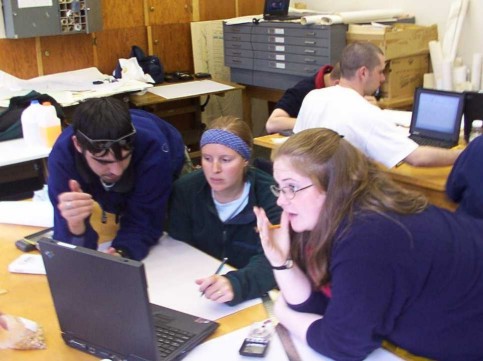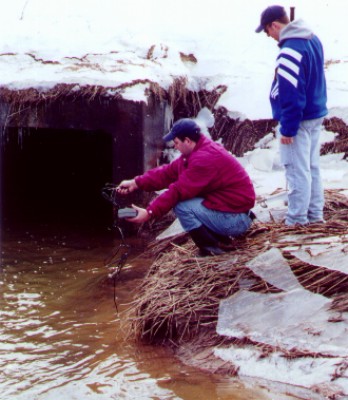Frequently asked questions about Earth and Environmental Science programs
- What can I do with a Geology or Environmental Science degree?
- What kind of person studies Geology? or Environmental Science?
- I did Geology in High School - do I need to take first-year university Geology?
- What do I do in Geology courses?
- How do you use computers?
- Why do I need Maths, Physics and Chemistry?
- What are majors (and double majors) and minors all about?
- Should I do Geology or Environmental Geoscience or Environmental Science?
- What is Professional Registration?
- Do you have a Co-op program?
- Can I switch into Geology or Environmental Science at Acadia?
- Who do I contact for more information?
- Who is my advisor
What can I do with a Geology or Environmental Science degree?
Four main career opportunities lie at the end of a Geology degree:
- mineral exploration
- environmental geology
- oil and gas exploration
- graduate school, research opportunities
These, and a host of other less conventional opportunities, are described more fully at our careers page. However, in the past 10 years (2012-2022), a survey of our 203 graduates in Geology and Environmental Geoscience shows the following breakdown of careers:
- 56% are working in jobs based on their Geology degrees, in the following areas:
- 22% working in the mineral resources sector
- 15% working in the environmental/hydrogeological sector
- 8% working in the oil and gas sector
- 11% working in the IT sector
- 30% have gone to graduate school (MSc, MBA, PhD programs)
- 2% have gone into teaching
- 4% are working in government
- 10% others have pursued more individual careers, including the Canadian Air Force, Canadian Navy, paramedic, or other degrees (law, BA, meteorology, veterinary, pharmacy, IT)
- the remaining 17% have not told us what they are doing.
The pie charts below show how these destinations have changed since 7 years ago:

For location, of the 160 graduates in the past 10 years for which we have information:
- 30% are working in Atlantic Canada
- 36% are working in Ontario or Quebec
- 19% are working in Western Canada
- 4% are working in the North
- 5% are working in the USA
- 6% are working overseas
The field of Environmental Science is broad but quite well defined. Furthermore, it is an expanding field where interdisciplinary specialists are increasingly in demand. In Canada, the field recognizes three major sectors for employment - environmental protection, the conservation and preservation of natural resources, and environmental sustainability. These three sectors are further subdivided into 19 sub-sectors covering areas such as waste management and environmental health, energy, fisheries and resource management, as well as communications and policy development. Currently, the environmental sector is one of the fastest growing areas of employment in Canada. See the ECO Canada website for more details.
Over the period 2012-2022, 140 students have graduated with BSc in Environmental Science from Acadia. Of these:
- 24% are working in the environmental sector
- 12% have gone to graduate school in Environmental Science
- 11% have gone to graduate school in other areas (Medicine, Law, Business)
- 9% are working in each of the government, the mining sector or the IT sector
- 11% are working in fields not directly related to their degree area
- we would like the remaining 33% to tell us what they are doing
The pie charts below show how these destinations have changed since 7 years ago:

Geographically Environmental Science graduates are working as follows:
- 55% in Atlantic Canada
- 21% in Ontario and Quebec
- 9% in the West
- 1% in the North
- 3% in the USA
- 11% overseas
 |
What kind of person studies Geology?Geology is the study of the Earth - so it needs a person who is interested in the world around us. Someone who is aware of the planet we live on, who enjoys outdoor learning, who is willing to use scientific skills to understand the world, who doesn't mind dirty hands, who can think. In Geology we work in four dimensions - north-south, east-west, up-down, and back-forward in time. You must be willing to think a bit bigger and broader than in some other sciences, and be prepared to toss around millions of years as if you were living them! Geology, and Earth Sciences, in general, employ physical, chemical, biological, and mathematical methods to investigate the Earth - while you don't have to be a physicist, chemist, biologist, or mathematician, you have to be able to talk to these people and understand the points they make. A Geology student therefore takes first-year university courses in most (or all) of these subjects. What kind of person studies Environmental Science?Environmental Science is an interdisciplinary program that gives students an opportunity to develop a broad-based understanding of our environment through the study of a number of disciplines. As a result, environmental scientists are able to approach problems from a variety of perspectives. Students have opportunities to work with professors in a variety of fields, including geology, biology, chemistry, and the humanities. They are part of an active research environment and often participate in public discussions regarding environmental issues at local and provincial levels. |
I did Geology in High School - do I need to take first-year university Geology?
We strongly recommend that you tackle the first year courses. Different schools teach Geology very differently, some emphasizing rocks and minerals, others putting more weight on landforms, geography, or fossils. The first year course brings everyone up to speed across the subject, plus in the second term the course is taught as a journey through time, an approach not usually used by high schools. If you think you have done a course equivalent to first-year Geology, let us know the details, and we can assess your situation. Occasionally we do make special arrangements, e.g. from the Quebec CEGEP system. We might ask you to take an exam to be sure.
What do I do in Geology courses?
Geology courses vary a lot! In first year courses, you get an overview of the whole science, including identification of minerals, rocks, and fossils, learning to use maps, discovering how the landscape developed, examine the wanderings of the continents by plate tectonics, understanding the processes involved in melting and crystallizing rocks, depositing mud, sand and limestone, and taking a journey through time from the origin of the Universe to the end of the recent Ice Age. You will also get to go on field trips to local igneous, sedimentary and metamorphic rock localities.
After the first year, you start focusing on the techniques we use in Geology. In the second year, you take courses in paleontology, mineralogy, geomorphology, and stratigraphy, which give you the skills to participate in the junior field school at the end of the year. In the third year, you use these skills to understand the formation and development of igneous, sedimentary and metamorphic rocks, examine the processes of rock deformation and plate movements, and you can take optional courses in geophysics, geochemistry, atmospheric science, petroleum geology, or hydrogeology. With this solid background in Earth sciences, you finish your degree with a course in Geology of North America, and a wide range of optional courses depending on your interests, including a two-week senior field school held in Cape Breton Island or a one-week field course on carbonate rocks in Bermuda.
In any one week, you may be going from class to class, one day sketching fossils, another day examining rocks in a microscope, and the next day drawing cross-sections through geological structures. Many of the classes make extensive use of laptop computers to analyze the geology. In the fall term, many of the courses have field trips to local examples of well displayed geological structures, and even in the winter term we try to get into the field where possible.
How do you use computers?You may be surprised! We use them a lot. Almost all Geology lectures are done via PowerPoint projection, and professors generally provide some component of their lectures for you to review the topics. We also have many specialized uses of the computers, that have greatly enhanced our ability to provide a first-class Geology program. For example, in several courses you will plot information in 3D using computers; you will analyze data from drilled wells and measured outcrops on computer; you will use your laptops to review the recent weather, earthquakes, and volcanic eruptions; you will learn world geography by computer (see this page for an example); and you will make ground measurements in geophysics and plot them up to analyze on your computer. You will write your papers, do much of your homework, and draw maps on your computer. And, of course, we communicate a lot by e-mail! By the end of it, you will have become far more comfortable and capable with computers than you ever thought possible, without even noticing you tried! |
 |
Why do I need Maths, Physics and Chemistry?
Geology is a science that builds on the fundamental natural sciences. As such, you will be using basic skills in these subjects. For example, you will be determining chemical reactions between minerals in metamorphic rocks, you will be performing and analyzing seismic experiments in the ground, looking at the propagation of waves into the bedrock, and you will be tracking the flow of water and magmas underground. All these require a basic knowledge of Maths, Chemistry and Physics.
What High School Maths, Physics and Chemistry do I need?
Physics - none. Provided you can handle the other science subjects, first-year university Physics is taught from first principles, so you will get all you need there. Some high school background won't hurt, though!
Chemistry - you must present Nova Scotia grade 12 Chemistry or equivalent. This is definitely required to do first-year university Chemistry. If you don't have this course, you can pick it up by correspondence from the Nova Scotia Department of Education. Check with us if you decide to do this. We have had several students complete the Nova Scotia Dept. of Education Chemistry 12 course successfully, and do well in university Chemistry following that.
Mathematics - this is more complex, and we advise you to review the university calendar for the fine details. For Geology programs, we recommend you do MATH 1013 and 1023 at Acadia (Calculus), but recognize that a variety of courses lead up to it in various high school or college programs. If your Maths skills are not so strong or were acquired a long time ago, we recommend you consider the non-credit course MATH 0120 (Pre-calculus mathematics) to catch up - this course is offered in the term, in summer, and online. Calculus is a requirement for professional registration in some jurisdictions, so to work as a professional geologist, you may be required to have this course. (For those who don't want to do Calculus, other Math courses are acceptable - but do check with us first to be sure they are eligible credits.
For Environmental Science programs, you will need two courses in Statistics (either MATH 2233/2243 or MATH 2213/2223). If you can find the time and opportunity to take calculus too, it will be to your advantage. What's professional registration?
What are majors (and double majors) and minors all about?
The "major" is the subject you concentrate on - if you hold your major in Geology, you take 16 (one-term) courses in Geology (out of 40 needed for a degree), plus specified courses in Maths, Chemistry and Physics. Some people choose to do a "double major" - this involves doing 14 courses in Geology if Geology is your "first major", and generally about 10 courses in your "second major". You will notice that this option gives you a broader science degree, where you do not focus your studies as much. As such it is a useful degree for people considering careers in teaching or moving into a cross-disciplinary field after graduation (geophysics, mathematical geology, meteorology). You would not, however, be eligible to register as a professional geologist with a double major degree, without taking several extra Geology courses.
It is not possible to "double-major" with Environmental Science and another subject for the second major. However, students can do a double major in Biology, Geology, Chemistry (or any other subject) with Environmental Science as the second major. In this case, they must take at least four ENVS courses, and 6 more courses from ENVS, BIOL, GEOL, CHEM. If the first major is Biology, Geology or Chemistry, the 6 courses must be in the other subjects in this list.
The "minor" involves four courses in a second subject, chosen from one area. At least one of these courses must be above the 1000-level. For the Geology or Environmental Geoscience program, the minor can be in any subject (Science, Arts) offered at Acadia, or you may opt to complete a "General Science minor" which involves 9 courses Math, Biology, Chemistry, Physics, Computer Science, or Environmental Science. The General Science minor is the most common minors used by Geology majors, but several graduates use Physics, Math, Biology or History. The purpose of the minor is to ensure you have a little extra background in another subject. It does not appear on your degree. The Environmental Science program does not require a minor.
 |
Should I do Geology or Environmental Geoscience or Environmental Science?The Earth and Environmental Science Department at Acadia offers three degrees, the B.Sc. in Geology, the B.Sc. in Environmental Geoscience, and the B.Sc. in Environmental Science. The first two of these degrees lead to professional registration in Nova Scotia. The differences between them don't appear until the second or third year of the program - in B.Sc. (Geology) you do more in the study of igneous and metamorphic rocks, plate tectonics, and economic geology; in environmental geoscience, you do more in the study of geochemistry, geophysics and environmental science. |
What is Professional Registration?
In order to work as a geologist, most jurisdictions require you (or your boss) be registered as a professional geologist, geophysicist, geochemist, or environmental geoscientist. The details of this vary from province to province, state to state, country to country, however it basically requires a full Geology degree, and sometimes a few more courses, a few years of experience in the field, and membership in a professional association. In Nova Scotia, this is the APGNS - the Canadian Geoscience Standards Board web page will give you links and full details about other jurisdictions in Canada. The Acadia degree was modelled on the requirements by APEGGA, the association in Alberta, and meets the requirements for all other jurisdictions our graduates have tried to be registered in. You can view a slide show that describes all the details about professional registration on our web pages.
Environmental Science as a separate discipline does not have professional registration (yet). Instead, individual programs are accredited by the Canadian Environmental Accreditation Commission, through ECO.ca. Our program was one of the first to be accredited in 2010.
Do you have a co-op program?
Yes, there is a very active co-op option in Earth and Environmental Science. It involves three four-month terms in the workplace, which of course will extend your degree a year, but provides an excellent opportunity to get your foot in the door in the industry. In the past, Geology co-op placements have been made at:
Geological Survey of Canada (Atlantic) in Dartmouth;
Fundy Geological Museum, Parrsboro;
Suncor Oil Sands, Fort McMurray;
Atomic Energy Commission, Chalk River Ontario;
Environment Canada, Bedford and Ottawa;
Iron Ore Company, Labrador City;
Nova Scotia Dept. of Natural Resources;
Endeavour Mining Corp., Bedford, NS;
St. Andrews Goldfields, Ontario;
Joggins Fossil Institute;
University of Leiden Paleontological Museum, Netherlands;
Newmont Australia, Waihi, New Zealand
Environmental Science placements have been made at:
Acadia University, Biology Department;
Town of Pictou;
Municipality of Chester;
Sackville Rivers Association
Nova Scotia Dept. of Natural Resources;
Environment Canada, Hull, Quebec;
Bluenose Coastal Action Foundation, Lunenburg;
Stantec Environmental, Dartmouth;
Agriculture and Agri-Food Canada, Kentville;
Canadian Food Inspection Agency, Ottawa;
Northern Environmental Action Team, Dawson Creek, BC;
WUSC, Ottawa/Malawi;
Margeree fish hatchery.
If you are interested in the co-op program, you apply through the Co-op Education home page. Co-op is available in Geology, Environmental Science and Environmental Geoscience.
Can I switch into Geology or Environmental Science at Acadia?
Provided you have (or can acquire) the necessary prerequisites (usually Grade 12 Chemistry and Math), you can switch into these programs. Most students studying Geology come by this route! If you think you might be considering a change in major, make an appointment with the department head to discuss your options. He will ask you about why you are thinking of studying the new area, what you see as your career goals, and what your science background is like. Even if you don't intend to switch majors, but want to do more Geology or ENVS courses, contact the department head - you may want to join his mailing list for Geology majors to keep up on what is happening in the department.
Who do I contact for more information?
Contact the head of the Earth and Environmental Science Department for any further information: ees@acadiau.ca
Who is my advisor?
Each student at Acadia is allotted an academic advisor. You should know who this is, and contact them about any academic issues arising. For students in the Earth and Environmental Science Department:
Dr. O'Driscoll is the advisor for all (ENVS) Environmental Science majors,
Dr. van Rooyen is the advisor for (ENGO) Environmental Geoscience and (GEOL) Geology students;
but first-year students may also discuss issues with Dr. McMullin, our first-year lab instructor.
